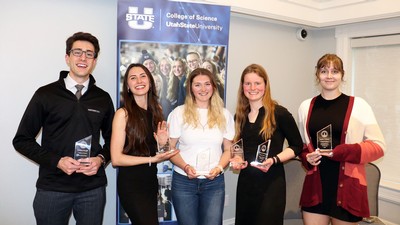Dead Week Survival Guide: How to Combat Finals Anxiety
The Student Life section of Utah State Today highlights work written by the talented student journalists at Utah State University. Each week, the editor selects a story that has been published in The Utah Statesman for inclusion in Utah State Today.
By Farlin Paulino, USU Statesman, Tuesday, Dec. 5, 2017
Anxiety is normal. In short bursts, anxiety can improve motivation and performance. When it comes to finals week, however, it can be an unpleasant sensation that affects students negatively.
“We notice that there’s a lot of anxiety that happens around testing,” said Melanie Chambers, a learning specialist from the Academic Success Center at Utah State University.
The learning specialists at the Academic Success Center have developed workshops and services to aid students in discovering new ways to study effectively and relieve anxiety during finals.
“One thing I love to do is have students think about what the purpose of a test is,” Chambers said. “If its purpose is to demonstrate you know the information, then it’s a good thing to be tested on now when it’s not as high stakes as it might be later on in your career.”
Chambers said just thinking of the purpose helps with anxiety levels.
There are some testing strategies students can follow to figure out test answers.
“The number one thing to do when you’re feeling that anxiousness is to prepare on time,” Chambers said. “We have a five-day study plan which works by breaking down the content into little manageable chunks five days ahead of time instead of the night before”.
When students visit the Academic Success Center they receive help tailored to their needs as well as different strategies to help them prepare for a test.
“We’ll break the content up and then also change how they study it,” Chambers said.
Chambers helps students with study groups, flashcards and even review practice tests to help students remember content.
“Hopefully those different ways will help students remember it when it comes down to the test,” Chambers said.
The Academic Success Center hosts workshops every week during the semester and covers various topics from overcoming writer’s block to how to talk to professors.
“We have these workshops everywhere on campus and are mainly designed so that we give students something to take away with them that they can implement right now,” Chambers said. “It might be different strategies that they can use or maybe even it’s just changing their mindset.”
To combat finals anxiety, Chambers advises students to prepare as much as they can beforehand and to view exams as a way to demonstrate what they know.
“Don’t wait until the last minute to do so,” Chambers said.
Chambers also doesn’t see bad grades as a bad outcome.
“If you don’t get a good grade that’s OK,” Chambers said. “A lot of times learning happens when we don’t get a good grade, as you discover what you need to work on.”
Another strategy Chambers suggests is to use the tests taken during the course to study for the final test, especially if they’re comprehension tests.
Chambers said the learning specialists at the Academic Success Center love the opportunities they have to work with students.
“There’s nothing better than analyzing a test with a student and be part of that lightbulb moment when they know what their issues have been,” Chambers said. “It could be time management, maybe the way that they take notes isn’t as effective, or how they read their textbook.”
As a way for students to reduce final anxiety, Chambers said there are always other options out there, but they don’t necessarily mean it’s going to make it easier.
“I think it helps if you’ve been preparing all semester. Then you don’t have to worry as much at the end,” said Maren Chadwick, a USU freshman.
The Academic Success Center is located in the Taggart Student Center in room 305. It opens at 8 a.m. Monday through Friday and has different programs and workshops available.
Interested students can also visit usu.edu/asc to see upcoming workshops and resources.
Comments and questions regarding this article may be directed to the contact person listed on this page.





